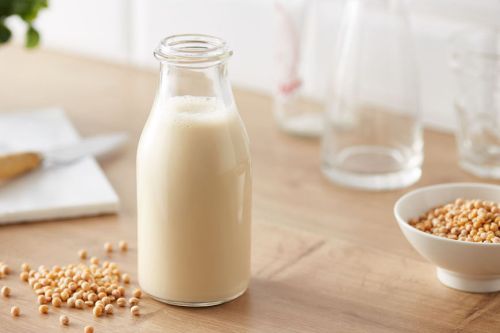In 2019, drinking soy milk is about as cool as Cady Heron at the beginning of Mean Girls. (Translation: Not very.) Newcomers oat milk, almond milk, and even sesame milk have taken precedence on store shelves and in alt-milk drinkers’ hearts.
So why has the OG dairy-free milk missed out on the glory of the current alt-milk revolution? “I think the main reason soy milk isn’t as trendy as some of the other options out there is because it’s been around for decades and people always want the latest and greatest thing,” says Mark Messina, PhD, MS, the executive director of the Soy Nutrition Institute, a research organization created by the US Soybean Association and industry executives.
But there are other elements beyond the “cool factor” at play too, he says. Dr. Messina, who has studied soy’s health effects since the 1990s, says that there have been a lot of misconceptions about the plant (and its associated products like soy milk) over the years. But some of those concerns…well, they aren’t totally justified (and definitely no excuse for letting a perfectly good carton of soy milk turn into, ahem, spoiled milk). Here’s the low down on what you should actually believe about soy milk.
1. Soy milk is one of the most nutritious alt-milks
A 2018 study found soy milk to be the most nutrient-dense plant milk compared to rice, almond, and coconut milks. Soy is actually the plant-based option that mostly closely resembles dairy milk in terms of its nutrient profile. “It can be a source of protein and calcium, especially for people that are dairy-intolerant,” says Taz Bhatia, MD, a women’s hormonal health expert and board-certified integrative medicine physician. (Soy milk has seven grams of protein compared to milk’s eight grams per serving, and both have 300 milligrams of calcium.) It’s also rich in vitamins A, D, and K.
It is also a fairly sustainable choice for the planet. The BBC recently cited Oxford University research that found soy milk requires less water to make than dairy, almond, and oat milks, and production of it creates fewer emissions than rice and dairy milks (but more than oat or almond milk).
2. Soy milk likely will not mess with your hormones
One of people’s biggest hangups about soy milk (and soy in general) has been its association with hormones. “Soy contains isoflavones, which are a type of phytoestrogen,” Dr. Messina says. In soy beans, phytoestrogen acts as a defense system and helps cells communicate. But these plant compounds can act similarly to (or potentially interfere with) estrogen in the human body.
As people started to learn more about hormones, the idea of soy naturally having high amounts of these estrogen-mimicking compounds caused lots of concern. Integrative and functional doctor Frank Lipman, MD, has written in the past about his dislike of soy, saying it can disrupt thyroid and endocrine function, which can lead to fatigue, constipation, and affect menstruation and menopause. (Scientific studies generally dispute the belief that soy affects thyroid function in healthy adults; there is some evidence to suggest that consuming soy on the reg for a long period of time could affect the endocrine system.)
However, two of the experts we spoke to disagree with these concerns. “[Phytoestrogens] have effects that are unrelated to estrogen and even their estrogen-like effects are different from the hormone estrogen,” Dr. Messina says. Translation: Just because phytoestrogens are similar to estrogens doesn’t mean they’re the same thing—nor will they necessarily have a negative impact on your body. Dr. Bhatia agrees. “Phytoestrogens are different from regular estrogens, and serve a different purpose,” she says.
She adds that research has shown soy (and its isoflavones) can actually be good for you. “Phytoestrogens can bind to estrogen receptors, so in this way they are actually protective against hormone-based cancers,” she says. She stresses that soy does not cause cancer or have to be avoided in people with hormone-based cancers—a sentiment echoed by the American Cancer Society.
However, Heather B. Patisaul, PhD, associate professor in the department of biological sciences at North Carolina State University and an expert on endocrine disruptors, says that there are some caveats to the overall safety of phytoestrogens (like what’s in soy.) “How phytoestrogens might impact health depends on a lot of factors including your age, sex, stage of development, and general level of health,” she says. While most people will not have any negative health effects from a moderate intake, Dr. Patisaul says that people who are pregnant, in treatment for hormone-related cancers, or taking thyroid medications might consider talking about their diet with their doctor to ensure that their soy consumption won’t interfere with their health.
3. Not all soy milks have GMOs
Another strike against soy: GMOs. Soy is one of the most common genetically-modified foods in the U.S., which many conscious consumers are avoiding. However, Dr. Messina says that the bulk of that GMO soy is going to animal feed and not into soy milk or other soy foods. To his point, many popular soy milk brands are non-GMO, including Silk and WestSoy. Look for brands with an organic or certified non-GMO label to be 100 percent in the clear.
4. Soy milk can be super processed, so shop smart
Soy milk can be part of a healthy diet, but Dr. Bhatia says it’s important to remember that not all sources of soy are nutritionally equivalent. “Fermented soy such as miso, tempeh, and natto help balance the gut,” she says. “But soy in highly processed foods lack the same nutritional value,” she says (which is generally true for any whole food versus its processed counterpart).
Examples of the most processed soy foods include soy burgers and bars. Dr. Bahtia says some soy milks can be highly processed too, which affects its nutrient density (meaning you won’t get as many protein, vitamins, or minerals per serving). Before buying, check that nutritional panel. If the amount of vitamins A, D, K, calcium, and protein are almost nil, that likely means there’s a lot of fillers in there—and not even really all that much soy. The ingredients list should be minimal, and check that the milk is coming from whole beans, not the more processed soy protein or soy protein isolate.
Of course, soy isn’t for everyone. “Some people are intolerant to soy, which can cause digestive issues,” Dr. Bhatia adds. Many people are also just straight-up allergic to soy, making eating any product with soy a complete non-starter.
But in general, Dr. Bhatia gives the green light for consuming soy milk regularly, up to three times a week. “Go for a good quality one and non-GMO if you can,” she says. Sometimes the oldies really are the goodies.
Now that you’ve been schooled on soy, get the low-down on if starchy foods like rice and potatoes are healthy.
Sign Up for Our Daily Newsletter
Get all the latest in wellness, trends, food, fitness, beauty, and more delivered right to your inbox.
Got it, you've been added to our email list.











